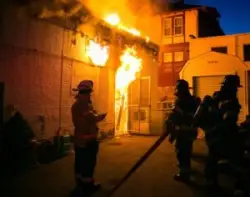
Commercial fires can devastate businesses and bring financial hardships that could set back owners temporarily or permanently. Smoke residue, soot, and ash can damage stock, walls, floors, ceilings, and more. Fiery outbreaks are unpredictable, so commercial fire coverage can reimburse commercial businesses for their losses.
This fact sheet contains things to know about commercial fire insurance claims. Business owners should prepare for the possibility of being in a battle with their insurance company to recover compensation. They can also work with a Corpus Christi insurance claims attorney who can help them.
What does a Commercial Fire Insurance Policy Cover?
The threat of a fire breaking out at a home or business is real. According to the National Fire Protection Association (NFPA), fire departments throughout the U.S. responded to an estimated 1.5 million fires in 2022. It reports that property damage from these blazes was estimated at $18 billion.
A commercial fire policy protects you financially if a fire damages your business’s physical property. Should a fire break out on your property, your insurance coverage should compensate you for lost or damaged property.
Before purchasing commercial fire insurance, find out what coverage you need. A standard commercial fire insurance policy is usually sold as part of a commercial property damage insurance policy. It generally should cover:
- Your business’ physical building. Your policy should include your business’ commercial buildings or offices.
- The contents in your business’ building. This includes everything stored on the property, such as equipment, furniture, inventory, etc.
- Someone else’s property that is in your care. For example, your fire insurance policy could cover equipment you use from a third-party company when that equipment is in your care, custody, or control.
Any exclusions to your policy depend on the property insurance policy you get.
What Are Covered Costs Under a Commercial Fire Insurance Policy?
While fire is the first thing that comes to mind when thinking about fire insurance, these liability policies cover other costly damage associated with fires. For example, if firefighters answer a call about a blaze on a business premises, the water and materials used to put out the flames can damage the structure or its contents.
Some commercial fire policies cover water damage and damage from firefighting materials, such as foams and powders. They also could cover fire department fees and service charges should your local fire department have to answer an emergency fire call concerning your business’ property.
We have offices in Houston, Corpus Christi, and Victoria; and will travel to any corner of Texas if we are capable of preventing an injustice.

Quick Tips for Filing a Commercial Fire Damage Insurance Claim
If you must file a commercial fire insurance liability claim, you should:
- File a police report. You should call law enforcement so it can document the fire. Get a copy of the accident report. Ensure it documents what happened accurately and that factual details are correct, such as the location of the fire, the date and time, and other information.
- Take inventory of what’s left after the blaze. You should have a general idea of what was and wasn’t damaged in the fire. You can document your belongings and their condition with photographs, video footage, and journal entries or notes. Images that show your items’ before and after conditions can be helpful. You should leave things in their original state so the insurance adjuster can evaluate the damage.
- Estimate your damages’ financial value. As you review your inventory, note the burned items you must repair or throw away and estimate the dollar amount of each item. If you have evidence proving an item’s value, that can help your case. Any receipts, invoices, and other documentation you have to prove your financial losses can bolster your claim.
- File your claim promptly. The sooner you file your commercial fire insurance claim, the sooner the claims process can get underway. You must contact your insurance provider and request a proof of loss form. You should fill it out and be specific. Include details like the loss date, the loss and damage suffered, and whether anyone sustained injuries.
- Meet with the insurance claims adjuster for an inspection. When you meet with the adjuster, they will survey the fire damage and file a report. Once they submit their report, the insurer will estimate the dollar amount of your damages and possibly issue a payment.
The claims process can take longer than you might expect, so take care to pay attention to all deadlines. You can also work with an attorney, who can review your policy and explain any unclear language.
Your Insurer Could Reject Your Commercial Fire Insurance Claim
You expect your insurance provider to uphold its obligations. However, your claim may not yield the result you expect. Insurance companies can dispute or reject parts of your claim outright for any reason.
Common reasons include:
- An uncovered event caused fire damage, such as wear and tear, mold, or flooding.
- Your policy doesn’t cover the specific fire damage your business suffered.
- You did not pay your premiums or pay them on time.
- You did not file your commercial property claim on time.
- You did not present sufficient evidence or documentation of the fire damage.
- Your damages don’t exceed the deductible.
There is no shortage of reasons why insurance companies dispute fire claims. Still, the insurer does not always have the last word on a claim. It also doesn’t have the burden of proof in a denied claim case. That falls to the business owner. If that’s you, you can work with a commercial fire insurance claim attorney who can build your case to challenge the insurer’s assessment.
Representing the injured in all areas of Texas that extends back over 40 years

How an Attorney Can Help Your Commercial Fire Insurance Claims Case
If your business suffered fire and smoke damage, you should consider contacting a commercial fire loss attorney who can review your claim and advise you on the claims process. They can also:
- Investigate the fire’s cause.
- Review your commercial fire insurance policy to understand your coverage.
- Talk with your insurer to understand the reason for the claim denial.
- Consult with experts for a professional opinion.
- Gather evidence to prove your claim, including eyewitness testimony.
- Assess and calculate the value of your damages (e.g., lost income if you had to close your business, smoke damage, water damage, damaged or lost items).
- Negotiate with the insurer for your compensation.
- Identify other parties that could owe you damages.
- File a lawsuit for bad-faith insurance claims.
This commercial fire insurance claims fact sheet covers only some of the basics of how this coverage works and what legal representation can do for you. For personalized advice, talk with an attorney.
You need a skilled advocate to protect your legal rights and present your claim in such a way as to maximize your recovery.

Call Carrigan & Anderson, PLLC Today for Help With a Commercial Fire Insurance Claim
When you hire our insurance claims lawyer, we will take the stress out of pursuing an insurance company that wants to pay you little or nothing for losses after a commercial fire.
Attorneys Stephen P. Carrigan and David M. Anderson have protected Texans’ rights and interests for more than 40 years and work diligently to get them every penny they deserve. We want to do the same for you. Call us today for a free, no-risk consultation.
At Carrigan & Anderson, PLLC we can talk to you about your options and rights.


